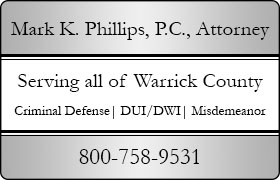Winslow Felony Lawyer, Indiana, page 5
Sponsored Law Firm
-
 x
x

Click For More Info:
-
Law Offices of Mark K. Phillips
114 South Third Street P.O. Box 427 Boonville, IN 47601» view mapDUI-DWI, Criminal Defense, Personal Injury Top Rated Indiana DUI Defense Lawyer
I offer passionate, loyal and fierce representation. I have over 20 years of experience to fight your Indiana DUI charge. I offer a free, initial consultation.
800-291-416 -
- Contact
- Free Consultation
- Visit:
- Website
- Profile
Not enough matches for Winslow Felony lawyer.
Below are all Winslow Criminal lawyers.
Danny E. Glass
Landlord-Tenant, Estate, Family Law, Criminal
Status: In Good Standing *Status is reviewed annually. For latest information visit here
Katharine Vanost Jones
Juvenile Law, Divorce & Family Law, Federal Appellate Practice, Other
Status: In Good Standing *Status is reviewed annually. For latest information visit here Licensed: 47 Years
Brian Joseph Oberst
Lawsuit & Dispute, Divorce & Family Law, DUI-DWI, Criminal
Status: In Good Standing *Status is reviewed annually. For latest information visit here Licensed: 19 Years
Robert L. Canada
General Practice
Status: In Good Standing *Status is reviewed annually. For latest information visit here Licensed: 42 Years
Ross Eldon Rudolph
Other, Lawsuit & Dispute, Divorce & Family Law, Criminal
Status: In Good Standing *Status is reviewed annually. For latest information visit here
Steven Keith Deig
Estate, Divorce & Family Law, Criminal, Accident & Injury
Status: In Good Standing *Status is reviewed annually. For latest information visit here Licensed: 47 Years
Randall Keith Craig
Social Security, Estate, Criminal, Civil & Human Rights
Status: In Good Standing *Status is reviewed annually. For latest information visit here Licensed: 50 Years
David Anthony Guerrettaz
Juvenile Law, Divorce & Family Law
Status: In Good Standing *Status is reviewed annually. For latest information visit here Licensed: 34 Years
John Andrew Goodridge
Criminal, Guardianships & Conservatorships, Power of Attorney, Health Care, Divorce & Family Law
Status: In Good Standing *Status is reviewed annually. For latest information visit here Licensed: 29 Years
Glenn Alan Grampp
Lawsuit & Dispute, Family Law, Criminal, Accident & Injury
Status: In Good Standing *Status is reviewed annually. For latest information visit here Licensed: 52 Years
 Mark K. Phillips Boonville,Indiana
Mark K. Phillips Boonville,Indiana About UsMark K. Phillips
About UsMark K. Phillips Contact UsCall or Email Now
Contact UsCall or Email Now